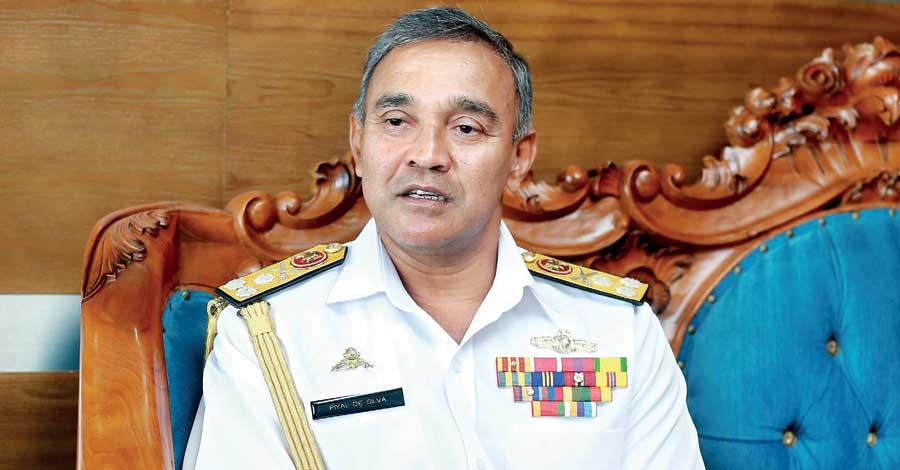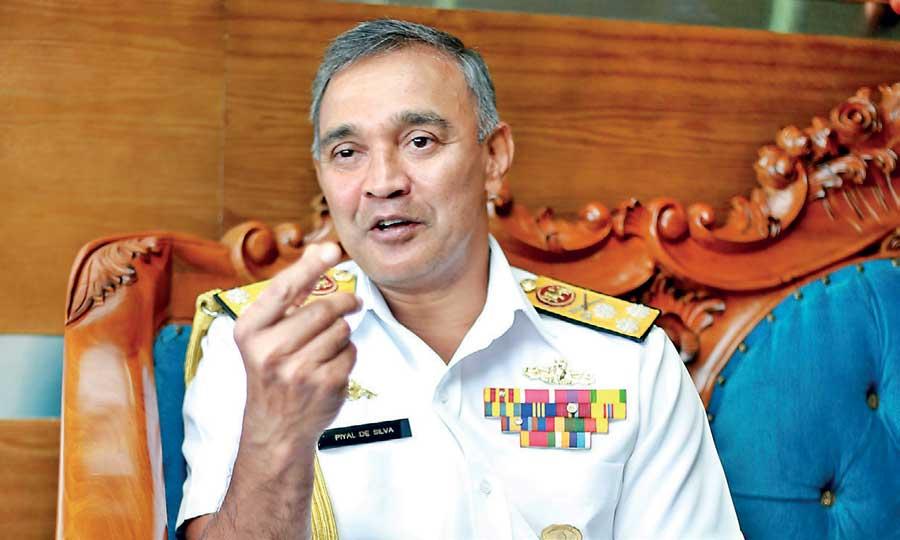01 Mar 2019 - {{hitsCtrl.values.hits}}


Q You were in command of the vessel which destroyed a crucial LTTE arms ship in September, 2007. What was the nature of your responsibilities during this crucial time period?
The event you referred to is only one incident. Before that I engaged in many counter terrorism activities. I’m specialised in deep sea diving and salvage and had the opportunity of using my knowledge and skills I gained with my specialisation to a great extent during the conflict. I also engaged in Explosive Ordnance Disposal work on land, as well as in the sea. My engagement in the sea is significant because I actively took part in clearing a number of sea mines as well as other Improvised Explosive Devises (IEDs) developed by the terrorists for maritime application.
There were very unique IEDs designed by the LTTE for maritime application. They initially started with command wire, which were subsequently developed into independent mines. So when it became independent there was no requirement to man the device, but to lay the mine and leave. They developed it into a limpet mine. A limpet mine is a type of naval mine attached to a target by three magnets. I was engaged in removing these mines in Trincomalee. The terrorists came up with this strategy to focus on an economical target and thereby impact the economy of the country. Their attempt was unsuccessful in this particular incident. Ordnance identification is a very crucial subject and this identification was through pure experience.
Q What were some of the memorable missions during your career?
In one particular instance in 1991, I was provided with the information that terrorists had laid a string of mines, somewhere near a jetty. I removed the mines whilst the terrorist who laid them, was there on the shore, with the command wire, battery and binoculars. I removed eight sea mines during this incident, without the terrorist’s knowledge. In retrospect it was a daring task which I took on as a young lieutenant.
Q Were there any challenges and hurdles you overcame during this time?
I engaged in rescuing 38 army personnel who were stranded during the Mullaitivu debacle for which I was presented a gallantry award. It was purely a voluntary contribution in saving the lives of these comrades. They were all injured except for two members of the Army medical corps. Of the 36, two died on the way and there were several who were critically injured.
In 1996, there was another instance where I was involved in an offensive amphibious operation in which one of the boats was attacked by the terrorists. The boat was completely destroyed. Eight of our members including two officers succumbed to injuries during that operation. My boat too was attacked by a RPG which penetrated the boat. Unfortunately for them and fortunately for me, the attacker in haste, did not remove the safety pin before launching the RPG and therefore it didn’t explode.
My most interesting command was the Sayura, the flagship vessel of the Navy from 2007 to 2009 until the termination of the war. The Navy at this time destroyed four gun donning ships while I was captain of Sayura. An operation was conducted under the mission commander leadership of Admiral Travis Sinniah. I must note that these missions were all group efforts of the Navy and the destruction of these crucial vessels turned the tide of the wave.
"One of the most dangerous activities, which we discourage, is the use of explosives in catching fish. we apprehended considerable quantities of explosive sticks"
Q Which areas do you think would be a significant challenge for the Navy in future?
Our classical role is to ensure that the maritime domain under our purview is safe, secure and serene, for trade to flow and for the harvesting of resources by our own people. Then we have another role, which is an obligation where the International Maritime Organisation ratification is concerned. We have been assigned a large search and rescue area and therefore the Navy is to engage in whatever search and rescue requirement which may arise within the domain under our purview.
Since we don’t have a known enemy now, the most significant challenge is to prevent the influx of drugs to the country. It’s a serious challenge because the perpetrators use the sea routes in the guise of fishermen to smuggle drugs here.
Q How is Sri Lanka placed in terms of non-conventional maritime threats?
The maritime trade is increasing daily. More ships in the domain mean that further enhancement of security will be needed. There would also be great amounts of maritime pollution. The shipping route from South Africa to Malacca Strait is one of the busiest. Whereas the shipping traffic from the Arabian and Red Sea is much less. However all these ships would be traversing close to Sri Lanka. The Navy is gearing up for potential threats and damage caused by maritime trade.
Q In this context, are there any plans to purchase further additions to the current fleet?
We are due to receive two more ships this year; one from China and the other from the Untied States of America. Those are basically ships that are donated to Sri Lanka. We have a maritime strategy designed for 2025. Our modernisation takes place in line with the maritime strategy. By 2025, Sri Lanka Navy should possess 20 large ships. We would be able to enhance maritime surveillance and patrol, while supporting search and rescue further.
"My most interesting command was the Sayura, the flagship vessel of the Navy from 2007 to 2009 until the termination of the war"
Q How challenging is it for the Navy to fight drug smuggling, in a background where Sri Lanka has been named as a regional hub for the transit point for mass-scale drug smugglers?
If there is no demand from the country, there will be no supply of drugs. If we can nullify the demand, ideally there won’t be any issue. If you calculate the amount of money being circulated in this unwanted business it is immense! It’s a colossal amount. You cannot imagine the street value of this contraband. Just a small amount would cost about Rs. 500. This value multiplied by the amount of drugs that was apprehended last year, comes to something around two billion. 2097 Kerala Cannabis was apprehended by the Navy alone last year. Police would have apprehended more on land. Usually they make two to three doses from 1 gram. There is a thumb rule that only 10% of the items being smuggled are generally caught. 90% of it could penetrate.
Q Given this experience, what kind of proactive measures would you encourage to tackle this issue?
The most proactive action is to educate and make people aware of the impending threat as well as the damage drugs could cause to the society. Eventually a large number of children would be addicted to drugs. Therefore school children and parents should be the focus in preventing this menace. If we can take proactive and preventive action I believe that this could be controlled to some extent. School, temples, churches and the mosques too could play a significant role in educating the young. Addressing this issue should start from the grassroots level. I’m determined to deploy my assets to curb this menace. Within just seven weeks of 2019, the Navy has apprehended over 600 kilograms of Kerala Cannabis on 10 occasions. The indirect impact of the drug menace involves a great cost to the Governments as well as the families of these smugglers.
Q According to your assessment, how has the Navy performed in terms of post-war reorientation of the military, especially over the past decade?
We have identified this as a serious concern. For instance the coastal population is especially affected by the drug menace. The population in Sri Lanka is very high as far as the coastal domination is concerned. Most tourist destinations are also around the coast and many tourists consume drugs. So it has become a lucrative business for the culprits. There’s a huge number of fishermen around the country using various type of vessels ranging from small canoes to multi-day fishing trawlers. Smuggling therefore can take place using any of these vessels and there are so many launching points around the country. Every point is flooded with canoes, fibre glass dingies, day trawlers and multi-day trawlers.
Even out at sea we cannot check each and every vessel unless we have firm information. Most of the time, the fisher folk have laid their nets while awaiting the catch aboard their boats. When we approach a suspected boat, our vessel would run over their nets and cause damage. Then the innocent fishermen are in trouble and that is why there is concern and resistance from the fishing community. If there’s a possibility of smuggling, our patrol officers would be inquiring into the incident.
Stopping a moving boat and carrying out a search is not an issue. But there are so many stationery boats around and the pursuit of a moving boat may damage fishing nets of the stationory boats, which is a serious challenge for us. Nevertheless we make sure that our engagement would especially contribute to control the influx of drugs.
Q In your view what is the most challenging aspect of the Navy’s relationship with fishing community?
One of the most dangerous activities, which we discourage, is the use of explosives in catching fish. In 2019, on six occasions we apprehended considerable quantities of explosive sticks. One stick of explosives would cause severe damage to the coral bed. If this continues we would have no fish in the future. Legal action against these practices are not that strong. These people often get away. Therefore a firm punishment for these culprits is necessary. With the special Dina-catch operation last year in Trincomalee we managed to apprehend a large quantity of explosives on 42 occasions.
We continue to arrest Indian trawlers that are poaching in Sri Lankan waters. Bottom trawling and taking away the catch after venturing into Sri Lankan territory cannot be tolerated. They damage the fishing nets of the local fishing crowds. They are aggressive and often do not heed our command. They are fully aware of the local fishing mechanisms and yet deliberately go over the local fishermen’s nets laid, causing damage.
"We have been assigned a large search and rescue area and therefore the Navy is to engage in whatever search and rescue requirement"
Q This dispute has been a cause for concern on both political and diplomatic fronts. Do you think both governments are addressing the dispute effectively?
The Government of India is trying to resolve this problem by introducing a new fishing method. But I think that most fishermen in the southern part of India do not want to embrace this new method. There are some who have accepted and tested the new practice, but the majority of fishermen are reluctant to do this. They think that the change would not help them and still engage in bottom trawling, despite subsidies.
Q Do you see any improvement after the new practice was introduced?
No. Just last week, several vessels were apprehended by the Navy.
Q Do you think the Government of Sri Lanka should take a stronger stance in resolving the issue?
Both parties have been involved in dialogue, but unfortunately implementation is very slow. If the matters discussed during the dialogue are properly implemented, I believe they should be able to address this issue effectively.
"If there’s a possibility of smuggling, our patrol officers would be inquiring into the incident"
Q US Admiral Philip Davidson of the Indo Pacific Command recently commended the Sri Lanka Navy as a well trained force with the potential to contribute to a multilateral maritime inter-operability. What does this sustained engagement mean?
Sri Lanka has a very unique foreign policy. We are friendly with all nations and the enemy of none. We will continue to maintain this stance though we engage with the United States. It is the same mechanism we would apply with other countries. We would engage with US exercises in order to maintain the inter-operability. In case of disasters we know that we need the assistance of other countries, especially in terms of Humanitarian Assistance and Disaster Relief. Even out at sea there are certain occasions where we need their assistance in terms of search and rescue. Recently we had a similar instance where one of our fishing vessels had broken down and drifted away towards the southern hemisphere. The US Navy came to our assistance and spotted the vessel in distress. They supported us in a simple way, but it was a great opportunity for us to maintain the inter-operability and finally rescue the people.

"There would also be great amounts of maritime pollution"
"Eventually a large number of children would be addicted to drugs. Therefore school children and parents should be the focus in preventing this menace"
Q India and the US have expressed concern over the Hambantota Port deal. What are your thoughts on this development?
Sri Lanka Navy has been the designated authority to implement the International Shipping and Port Facility Security Code (ISPS), for which our country is signatory. Therefore, similar to other ports we have deployed our people in Hambantota and made sure that the ISPS is properly implemented. Recently I visited the port and there was no restriction as I was free to move and inspect the security set up there.
Q Is there increased security at the Hambantota Port as speculated?
Depending on the situation we increase security. We have also requested to establish a Ready Deployment Team, for which the port group has responded positively. We cooperate well with with them in order to implement the ISPS code as well as to operate the radar to monitor all ship movements, along with other security equipment. Sri Lanka Navy has a base adjoining the port and we are now in the process of developing it further. 250 personnel are stationed at this facility.
Q Is there any truth in the reports that the US and Indian intelligence agencies would be allowed on request to visit these facilities?
There is no requirement for such intelligence agencies to come. The Sri Lankan Navy is there so why should other countries interfere? They should respect our sovereignty. As long as the ISPS code is implemented there is no need for all that
"By 2025, Sri Lanka Navy should possess 20 large ships"
"It is absolutely important that the Navy clears its name from these allegations. The Navy is a unique entity in defending the country"
Q In the case of the abduction and murder of 11 youths, serious allegations have been levelled against high ranking officials within the Navy being accorded privileges whereas witnesses involved complained of harassment. What are your thoughts on this?
There is an ongoing court case and we have to await the court’s decision. Once the court takes a decision, we have to abide by that ruling. Since there is an ongoing case, we cannot interfere in the matter. Therefore I cannot think of any other solution.
However we have taken this as a very serious case and have addressed our officers from time to time. We have advised our officers to stay within their given authority. We basically empower officers for various tasks. Empowering is giving an additional authority for people to work. But if you go beyond this authority, it may lead to unnecessary trouble. I always emphasise the need to follow the Navy Act and the Standard Operating Procedure and regulations to engage in their tasks and results.
Q Do you believe that there is intimidation and harassment within the ranks of the Navy?
If there is a case going on, we have our board of inquiry, and then of course promotions are not considered. I cannot deviate from such procedures. I cannot comment on decisions that other commanders have taken in this regard. I can only speak for myself and say with responsibility that I do not deviate from the standard rules and regulations of the Navy. I would strongly discourage any engagement in unnecessary practices or involvements. If someone is involved in any unwanted matter however, appropriate inquires would be conducted and the appropriate action would be taken. Other than this matter, there are several inquiries being carried out into certain other incidents. We are firm when it comes to the conduct of inquiries and investigating the truth.
It is absolutely important that the Navy clears its name from these allegations. The Navy is a unique entity in defending the country and an important assistance in law enforcement. As long as our name is clear, there would be a healthy respect towards the service.
This is only one incident with which our name has been tarnished. We have to wait until the court proves beyond any reasonable doubt that such a thing has taken place. Until such time, no one is to blame and the Navy is clear. Even though negative attention has been received by the Navy, today the best welfare project has been undertaken by the Navy which is providing water to people affected with kidney disease.
19 Apr 2024 7 hours ago
19 Apr 2024 7 hours ago
19 Apr 2024 8 hours ago
19 Apr 2024 9 hours ago
19 Apr 2024 19 Apr 2024